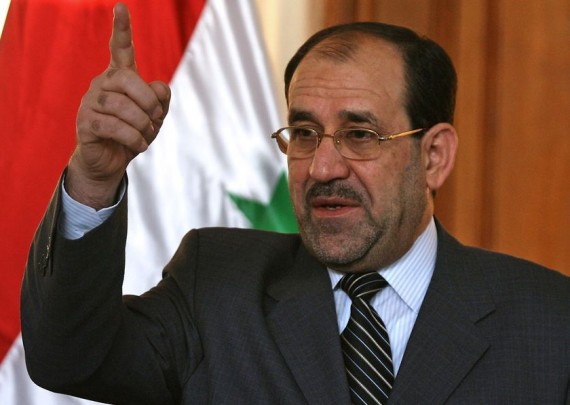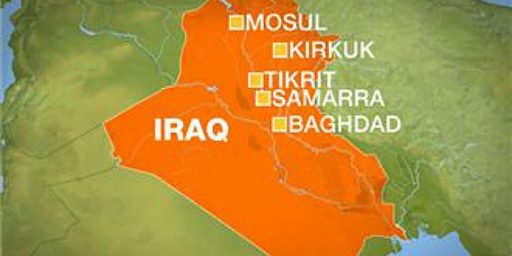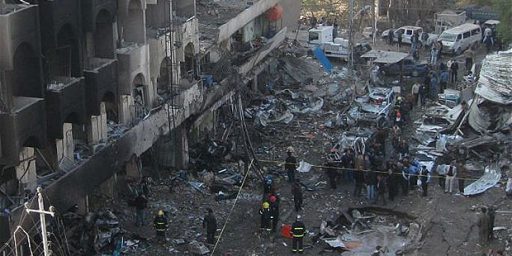Maliki Responding To Iraq Crisis In Worst Possible Way
Iraq's Prime Minister seems to be responding to the uprising in his country in a way guaranteed to make it worse.
Iraqi Prime Minister Nouri al-Maliki seems to be responding to the crisis in Iraq in exactly the worst way possible:
BAGHDAD — Prime Minister Nuri Kamal al-Maliki has presented himself as the man who could bring Iraqis together, but with the collapse of his army before a Sunni militant assault, he has taken on only one role — that of commander in chief of Iraq.
He is spending much of his time on the military side of the presidential compound, while some of his close civilian aides have taken to wearing starched military fatigues. He spends the better part of his day running the war.
He meets with military commanders, travels to the front lines, makes speeches at recruiting drives rallying young Shiite men and, not infrequently, falls into fits of anger, according to members of his inner circle.
What he does not do, by all accounts, is spend much time on the political reconciliation with the Sunni Arabs and Kurds that his international allies in Washington and Tehran have insisted is his country’s only possible salvation. Even his top aide in charge of reconciliation said Monday that he thinks it is all but hopeless at this point.
Now there’s a war, there’s not reconciliation,” said Amir al-Khuzai, a longtime friend of Mr. Maliki’s.
“With whom do we reconcile?” he said.
President Obama has made it clear that the United States will not provide military support unless Mr. Maliki engineers a drastic change in policy, reaching out to Sunnis and Kurds in a show of national unity against the Sunni militants, whose shock troops are the extremist Islamic State in Iraq and Syria. Without that, analysts say, the country is at risk of a renewed sectarian war in which Baghdad could lose control over nearly a third of the country for the foreseeable future.
But Mr. Maliki is showing few signs of changing his ways. Just as he did in a similar, though not nearly as threatening, crisis in 2008 in Basra, he is pinning his hopes on the military option. He is determined to use the Shiite fighters he trusts to stabilize the country and, he hopes, rout the Sunni insurgents and reimpose the government’s control over its territory.
In a rare show of concord, Mr. Obama has been joined by President Hassan Rouhani of Iran in pleading with Mr. Maliki to work with the Sunni Arabs and Kurds. As the Iraqi leader continues to resist those calls, though, the outside powers and prominent Iraqi politicians are increasingly questioning whether he will ever take such steps and, if not, whether to jettison him in favor of someone who will.
(…)
At times it has looked almost as though Mr. Maliki was going out of his way to alienate the Sunnis. After the Sunni tribes helped to defeat Al Qaeda in 2008, he cut off much of their funding.In search of insurgents, Mr. Maliki has authorized mass arrests of Sunnis and held many of them in prisons outside the law. He has also accused a prominent Sunni politician, Tariq al-Hashimi, of running a death squad, driving him into exile in Kurdistan, and has similarly gone after other prominent Sunnis.
Shiite politicians have said there are some immediate gestures Mr. Maliki could make that would help ease the tensions. He could release the thousands of Sunni prisoners detained by his security forces and being held without trial. He could make common cause with Sunnis and Kurds with statements against the Sunni militants, and he could work with them to bolster the military instead of turning to Shiite militias.
Convinced that there is a conspiracy to undermine him, Mr. Maliki speaks often of “failed politicians” who are working with the Islamic State in Iraq and Syria, while his associates describe “dirty deals” between the Kurds, ISIS and the Sunnis. The accusations are then answered in kind by Sunnis who have lost patience and now simply want the prime minister to resign.
Many Shiite politicians are deeply uncomfortable with Mr. Maliki’s more indiscriminate condemnations. “To say the Kurds are supporting ISIS is not a useful narrative,” said a former member of Mr. Maliki’s government. “We need the Kurds. Even the Iranians are telling him that.”
Mr. Maliki’s most recent general condemnations of non-Shiites came Sunday at a recruiting drive for volunteer fighters in Mahmudiya on the outskirts of Baghdad. Wearing a white shirt and dark jacket, he spoke with determination. “Politicians that have failed are standing next to ISIS,” he said. “We will fight you with free men.”
The worry is that, barring reconciliation, Iraq will split into a Sunnistan and a Shiastan, said a former ambassador, Ryan C. Crocker. Preventing that, he said, will take a heavy American diplomatic hand.
“Either we intervene at the White House and the secretary of state level or this is going to devolve into a bloody stalemate,” he said, “a line of demarcation between north and south, to be determined, but probably just north of Baghdad and the establishment of a de facto Al Qaeda state, and that’s completely terrifying.”
On some level, of course, the advice being given to al-Maliki to reach out to Shiites and Kurds even as a terrorist army advances on Baghdad seems somewhat naive. There is, after all, an immediate military crisis that needs to be dealt with, one that’s made all the worse by the fact that large elements of the Iraqi Army don’t seem to be at all willing to fight for the regime. At the same time, though, there is a large element of truth in the observations made by outsiders like Obama and Roubani that the Iraqi crisis has its roots in the fact that al-Maliki has used his government to enforce Shia supremacy throughout Iraq, and to victimize Sunnis and, to a lesser extent, the Kurds. He’s arrested Sunni Iraqis who were labeled as “militants” without any seeming proof of the same. He’s attacked Sunni leaders. To a large degree, he’s confirmed pretty much every fear that the nation’s Sunni minority had when the prospect of the majority Shiites gaining political power became a realistic possibility. In many respects, then, it isn’t all that surprising that Iraqi Sunnis in cities like Mosul seem to be greeting a group like ISIS as a liberator rather than rallying behind the government in Baghdad. What isn’t clear, though, is whether a united Iraq can exist as a democratic nation without some fundamental change in the way that the various ethnic groups view themselves and others.
The way forward from here is unclear. Even if al-Maliki did enact the reforms that Obama and others are suggesting, it’s not clear that it would be enough to make up for years of what Sunnis and Kurds view as repression. It’s going to take a lot more than just appointing a few Sunnis to the Cabinet to make up for what has happened in the past, for example. At the moment, though, it doesn’t seem as though al-Maliki is at all interested in political reform in Iraq. Reports are indicating that he and his advisers have taken to wearing military uniforms and rallying the Shiites against what is seen as impending attack on Baghdad. This morning on MSNBC, Richard Engel suggested that al-Maliki may end up responding to the uprising in Iraq in a manner similar to the way that Bashar Assad responded to the uprising in Syria in 2011. If that happens, then we’d be facing the possibility of an Iraq headed into ethnic civil war on a scope that would make Syria look like a picnic. At that point, we may have no choice but to respond.






You might want to read up on patterns of power in traditional Arab culture. The “access to water” model goes a considerable way to explaining a lot of modern Arab politics just as the “access to land” model does European culture.
If only Obama had insisted on keeping a small number of troops in Iraq against the wishes of the Iraqis, al-Maliki would magically be a unifying leader.
Both parties are saying that this is a huge failure of intelligence and Obama should take several steps to find out what is going on over there. This should have been seen.
See NBC news. U.S. intelligence must stay on top of this stuff. Now there is the ISIS group , or whatever it calls itself , going around committing atrocities right and left. How much is known about this group? Where are they getting their weapons and equipment.
“You want a war you can’t win ?” (Colonel Troutman, “Rambo”)
So in retrospect, which Bush-installed puppet was a more disastrously corrupt and incompetent choice — Karzai or Maliki?
@Tyrell:
C’mon…it was seen…way back in ’03. Maybe not ISIS…but the fact that this wasn’t ever going to end well was never in question.
Iran has been the winner of this debacle since the very first bomb dropped during shock and awe.
http://www.thedailybeast.com/articles/2014/06/16/iran-offers-iraq-everything-it-needs-to-fight-isis.html
@Dave Schuler:
Middle Eastern perhaps, but not “Arab culture.” And no, not good short-hand either.
Else, I would say Maliki has not yet plumbed “worst” yet. But he’s getting there.
The War Nerd profile in the other post was good. Overall the freak-out over ISIS strikes me as overdone.
Maliki is reacting in the worst possible way? Worst according to whom? Maliki has his own agenda and his own base of political support – he’s not an idiot, he knows what he’s doing.
@Andy:
Maliki is reacting in the worst possible way? Worst according to whom?
The author of this post. His name is Doug. It’s right at the top of the page.
@C. Clavin: Which is why at least one of the “intelligence” “sources” that claimed that Saddam Hussein had WMDs was on the payroll of Iranian intelligence.
@Andy:
It is fairly obvious that in fact Maliki does not know what he is doing, as the path he is taking is likely to end up with him out of power in the end. He does have his own agenda, of course, but he displays great clumsiness in its pursuit.
@Lounsbury: “It is fairly obvious that in fact Maliki does not know what he is doing, as the path he is taking is likely to end up with him out of power in the end. ”
My guess is that while he knows little about running a country, he does understand the other perks of power, and that the path he is taking is likely to end up with him in a penthouse in Geneva, walking distance from his money…
No, most known things about him point to him not being money driven – that is not a Chalabi – but a Shia ideologue and true believer.
Were he the Swiss bank account type, one would see a rather different behaviour set.
General Allenby- please contact Secretary Hagel; he needs to talk to you.
Arthur Conan Doyle is not available at this time to assist with your call. Please leave your name, crypt number, and a time when you will be by your ouija board and we will animate you within the next 24 hours.
@rudderpedals: message received.